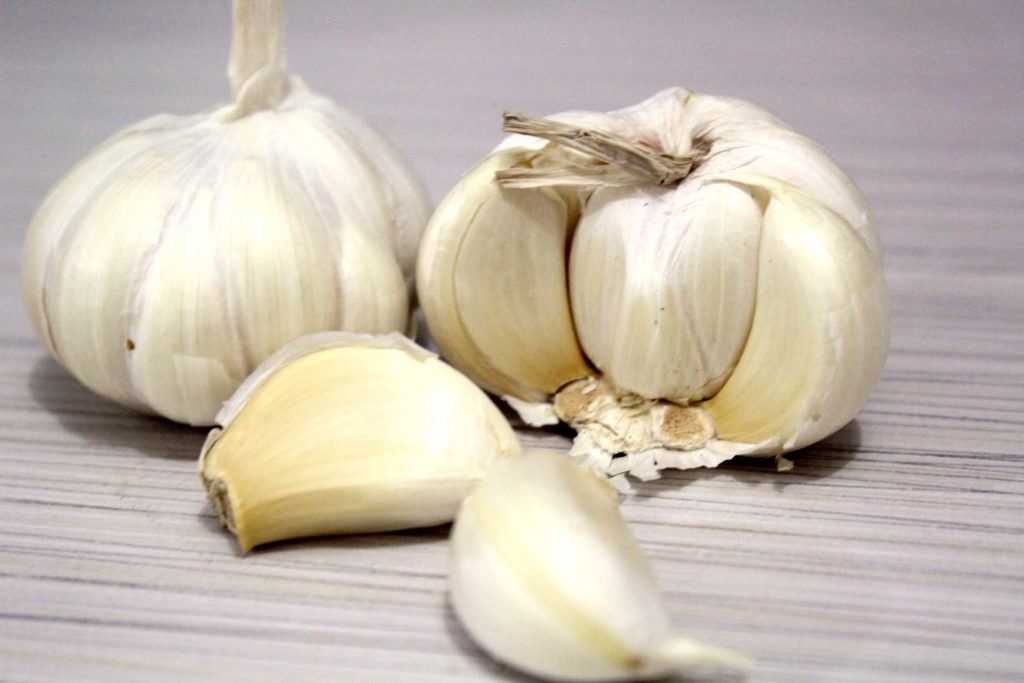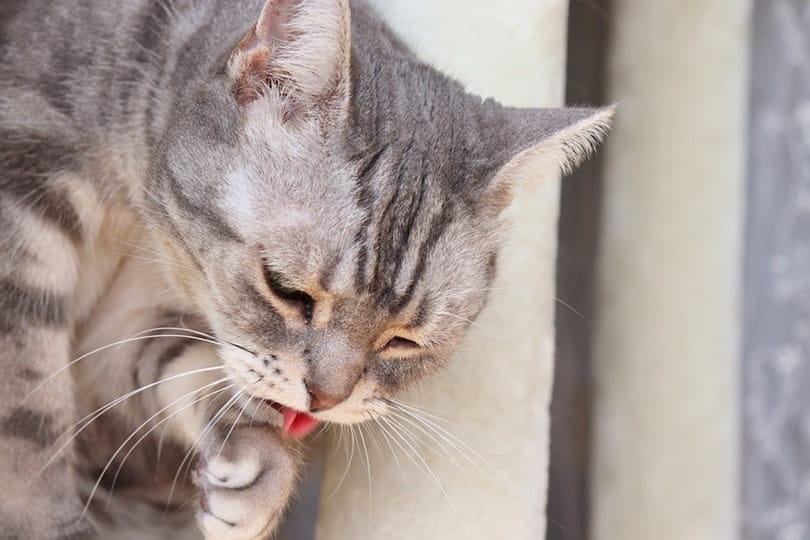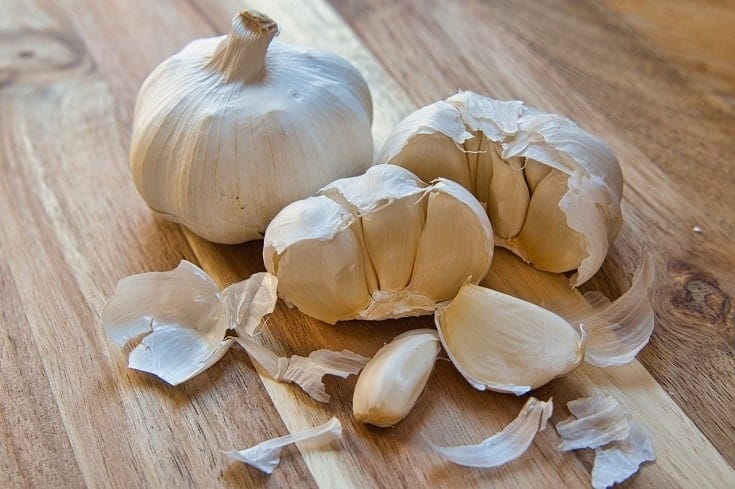Did you know that most bulbed plants are toxic to cats?1 Many of the flowers in your garden, including lilies, are toxic to pets. Your spice rack is also a danger zone for your curious kitty because of garlic and onion seasonings. As it turns out, this is no coincidence. Both garlic and onion belong to the lily family, Allium, a huge classification of bulbed plants that are mostly poisonous to pets. Whether your cat likes to poke their head in the kitchen or dig around in the garden, you’ll need to watch them closely and keep garlic out of their reach. If they ingest garlic, they’re at risk of garlic toxicity, a potentially fatal condition that requires immediate medical care.
Click to skip ahead:
What Is Garlic Toxicity?
Garlic toxicity occurs when a cat has eaten too much garlic. There isn’t an established amount of garlic known to be safe for cats, so you should avoid giving it to them entirely.
Garlic causes digestive upset in cats, but unfortunately, it doesn’t stop there. The compound sodium n-propyl thiosulfate causes garlic’s toxicity in cats. Sodium n-propyl thiosulfate actually destroys their red blood cells by making them weak and breaking them down, which can eventually make a cat anemic. If a large amount of red cells are damaged in a short amount of time, this can be difficult for the body to deal with.
Most times if our pets eat something they shouldn’t, we often watch and wait to see how they feel to determine if medical intervention is necessary. While there are times that this might be prudent advice, potential garlic poisoning isn’t one of them. Garlic is five times as toxic as onion and can quickly lead to death. You should take your cat to the vet immediately if you suspect they’ve eaten even a hint of a garlic plant, pinch of seasoning, or bite of minced garlic. All forms of garlic are toxic, but minced garlic is the worst because it’s super concentrated. Take note of how much they’ve eaten and get your cat to the vet.


What Are the Signs of Garlic Toxicity?
Again, you don’t want to wait for signs of garlic toxicity to start showing before you take your cat to the veterinary hospital. Signs can take up to a few days to appear, and by the time they do, garlic’s toxic compound has had time to destroy your cat’s red blood cells. If your cat is severely anemic by the time they receive medical care, their prognosis is more likely to be poor than if your cat treats them as soon as they ingest the toxin.
Try to get your cat to the vet within a couple of hours of ingesting garlic so that they can safely induce vomiting before the toxins have a chance to fully travel through their system. Don’t try to induce vomiting at home, however. Compounds that have previously been used to induce vomiting at home, can actually hurt their tummy, so you should only let your vet induce vomiting.
But what if you didn’t catch your cat eating garlic? If your cat is sick and you’re suspecting garlic poisoning, be on the lookout for these signs:
- Vomiting
- Diarrhea
- Loss of appetite
- Lethargy
- Pale gums
- Respiratory distress
- Dehydration
- Collapse
- Increased heart rate
- Increased respiratory rate
If you notice these signs, call your vet to see what to do next. You can also call the Pet Poison Helpline at 855-764-7661 or the ASPCA Animal Poison Control Center at 888-426-4435 if your vet office is closed to see if after hours emergency care may be necessary.
How Do I Care for a Cat With Garlic Toxicity
You should always take your cat to the vet if you know they’ve eaten garlic, regardless of whether they’re showing signs of toxicity or not. If caught soon enough, your vet may be able to induce vomiting and the crisis can be averted. If your cat is already sick, they’ll likely need to be hospitalized. Fluids for dehydration and a blood transfusion to replace the damaged red blood cells may be necessary.
The toxic compound uniquely damages your cat’s red blood cells, so your vet will be able to determine whether your cat is suffering from garlic toxicity or another condition. This is why it’s important to take your cat to the vet whenever they start acting weird. Garlic toxicity is certainly nothing to play with, but unfortunately it can be easily mistaken for an upset stomach, along with a variety of other illnesses.


Frequently Asked Questions (FAQs)
What are signs of garlic toxicity?
Garlic targets your cat’s red blood cells, which can lead to anemia and organ failure if not addressed in time. Unfortunately, some cases of garlic toxicity only manifest in neurological signs while others may show more signs of digestive distress. You should always take your cat to the vet immediately if you suspect they’ve eaten garlic. If your cat has severe vomiting, diarrhea, or shows signs of respiratory distress or collapse for no apparent reason, they could’ve inadvertently eaten garlic or may be suffering from another condition. In this case, you should call your vet immediately to see what to do next.
Help! My cat ate garlic. What should I do next?
If your cat ate garlic in any form—vegetation, chopped, or minced—take them to the vet immediately. In the best-case scenario, the garlic won’t have fully processed through your cat’s stomach when you get there. Your vet may be able to induce vomiting or give them activated charcoal to absorb the toxin, preventing the damage from progressing.
What are the chances of a good recovery?
The sooner you catch garlic poisoning, the faster it can be turned around and the more likely you’ll receive a good prognosis. Mild or moderate cases that are caught early are easiest to address. Your vet will be your best guide, so take your cat in as soon as you can.

Conclusion
Since garlic is highly toxic and signs of poisoning can take a few days to appear, you should always take your cat to the vet if they’ve eaten garlic in any form or amount. Keeping an eye on your cat’s behavior can help you spot signs that they’ve eaten something poisonous, even if you don’t catch them in the act. Always call your vet if you notice unusual vomiting, diarrhea, or if your cat appears to be in any type of distress to see what to do next.
Featured Image Credit: Anrita1705, Pixabay






